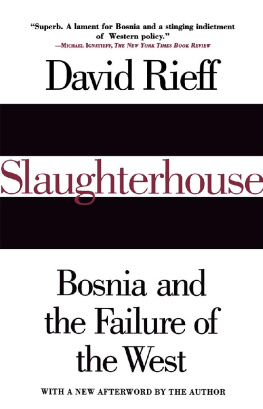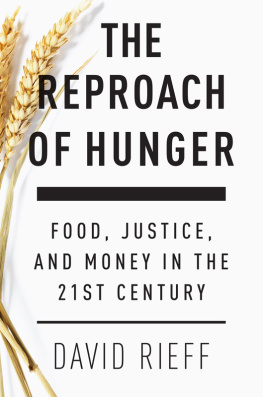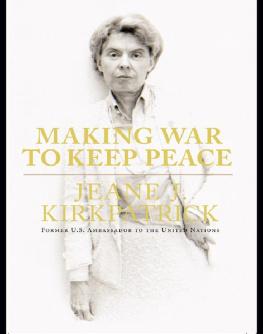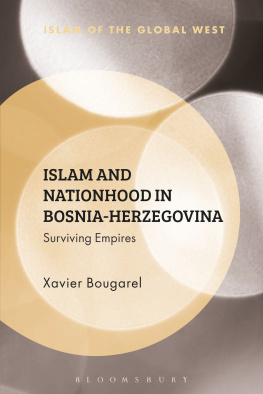Afterword
The defeat is total, the disgrace complete. I should have known better. There was worse to come, above all the Wests unabashed indifference to what was taking place in Bosnia. The Market massacre of February 6, 1994, seemed to mark the high point of the outside worlds concern about Bosnia for Bosnias sake. More than a year and a half later, NATO bombers did swoop down through the sky and delivered Sarajevo from its besiegers. But that was not out of concern for Bosnia. By then the United Nations mission was in shambles and the only choices left were either the withdrawal of UNPROFOR, an operation that American officials estimated at the time would have required a hundred thousand troops, or some new diplomatic and military engagement. Fearing the former, the Clinton administration, which had tried so hard to avoid dealing with Bosnia, finally committed itself to brokering a settlement. Instead of European inactivity and American inattentiveness, there was American initiative and Western European compliance. But in the interim, Bosnia as it had existed before 1992, had been lost.
Paying attention to Bosnia again did not come easily. By the beginning of 1995, most Western Europeans and certainly most North Americans were paying little more attention to the continuing war in the Balkans than they had to any of the many more distant tragediesRwanda-Burundi, Afghanistan, Chechnyathat seized and then relinquished the lead on the evening news. The fact that Bosnia was no more than a two-hour airplane ride from most major Western European cities seemed to make little difference. The slaughter there had become a fact of life, part of the foul weather of the historical season. People cringed when it was brought up, and mostly avoided the subject.
Troops from Britain, France, Holland, and Spain continued to serve, and from time to time, soldiers died. But the old imperial powers are not sentimental about their soldiers in the way that America is. In other words, though families might mourn, and the general public shudder when news came of a French soldier killed by a sniper or a Spanish armored personnel carrier falling into the Neretva River, drowning all inside, such losses did not sway those in power. In the chanceries of Europe, it had been decided, with varying degrees of regret depending on the country concerned, that the policy of resisting American efforts to lift the arms embargo while keeping UNPROFOR in place was the only one that made sense. The Bosnians were to be sacrificed, as one French diplomat told me, early in 1995, for Europes sake. It was unfortunate, he added, but we had no choice. All the other optionsintervention, the lifting of the arms embargo, and withdrawalwere worse.
The Bosnians were no longer surprised by this. They did not rage against the British and the French; they shrugged at each new example of United Nations double-dealing; and they no longer looked to the Americans for rescue with any degree of confidence. Since it had few other alternatives, the Bosnian government still pursued its campaign to affect American public opinion, and to press for the lifting of the arms embargo. In this, they were helped by Senator Robert Dole, the Senate Republican leader, for whom Bosnia had become something of an obsession. When the Bosnian Prime Minister, Haris Silajdzic, came to Washington, it was in Doles office that he usually got his warmest reception. Ordinary Bosnians, however, particularly outside Sarajevo, seemed less bedazzled by the idea of the United States lifting the arms embargo against them, let alone lifting it and bringing large quantities of weapons in, than by the fantasy of defeating the Serbs on their own.
Perhaps we wont win this year, a friend told me in Sarajevo in the early spring of 1995, but in the end we will succeed. When I asked why, his reply was simple. We must win, he said. Otherwise all this suffering will have been for nothing. The officers who are in training today will eventually lead us to victory.
It was a view that was propagated ceaselessly in the Bosnian press. By 1995, Bosnian radio and television as well as Oslobodjenje and its competitorstwo strongly nationalist papers, Liljan, the Lily, and Awaz, whose name is the Turkish word for the Voice were full of stories of upcoming government offensives. President Izetbegovic more than once insisted that his forces would break the siege of Sarajevo. He was not bluffing. During the cease-fire negotiated by the former US President Jimmy Carter in the late winter of 1994-1995, the Bosnian army, fortified in matriel thanks to arms shipments from the Islamic world and some surreptitious American help, planned its offensive. In May of 1995, it began. The result, as foreign military observers, and indeed, some senior Bosnian government commanders like General Jovan Divjak, said privately, was a disaster. A German war correspondent of long experience watched one Bosnian attack from the vantage point of a Serb artillery position west of Sarajevo. He said later, with a mixture of horror and admiration, that he had never seen artillery used with such murderous effect.
And yet until the realization of the failure of the offensive sank in, ordinary Bosnians, and some members of the elite, who should have known better, still believed that they could win the war on their own. The Bosnian government did its best to conceal the extent of the disaster at first, moving wounded from the Sarajevo front to military hospitals all over Bosnia. It had been a doomed effort from the start. For the offensive to have succeeded, the Bosnian forces around Sarajevo would have had to get artillery support from the well-equipped Croatian militia, the HVO, in nearby Kiseljak. But the Croats had no particular wish to see the Bosnians succeed at that point; they hated the Muslims, and besides, the Serbs were their partners in the black market. For the most part, their heavy guns never opened fire. On a scale of one to ten, a Bosnian commander told me later, we got one from the HVO.
The failure around Sarajevo mimicked the Bosnian governments ill-fated effort in late 1994 to break out of the Bihac pocket in the northwest of the country. With the airport closed and reserves dwindling, conditions in Sarajevo after the failure of the offensive began to deteriorate. They were worse in Bihac, though. By the spring of 1995, the enclave had its first cases of death by starvation. Not only were United Nations aid convoys not allowed through, but UNPROFOR seemed powerless even to protect the Bangladeshi battalion it had sent in to replace a French contingent that Paris had unilaterally decided to withdraw. The Bangladeshis had been deployed even though the ship carrying much of their equipment and weapons had not yet arrived in Croatia. In a way, it didnt matter that they could not defend themselves. The Department of Peacekeeping Operations in New York did not want them firing at the Serbs. In a flying visit to Bihac in 1994, General Michael Rose articulated the policy succinctly when he told UNPROFOR officials that he could not protect them when they came under fire since to do so would imperil the aid convoys UNPROFOR was escorting elsewhere in Bosnia.
In eastern Bosnia, the situation convoys had not gotten in for a long time. Even the UNPROFOR contingentsless than a hundred Ukrainians in Zepa, a few hundred Dutch in Srebrenica, and a few hundred British in Gorazdewere dependent on the Serbs for all their supplies. At times, when the Serbs cut off their fuel, they moved around on horse carts. In private, UN military officials were already pushing for an UNPROFOR withdrawal from eastern Bosnia in the winter of 1994-1995. On May 24, 1995, the overall UNPROFOR commander for the former Yugoslavia, Lieutenant General Bernard Janvier, told a closed meeting of the United Nations Security Council in New York that the three eastern Safe Areas were indefensible and that the UNPROFOR contingents should be withdrawn. Soon after, the British government began making its plans to evacuate its force from Gorazde.









